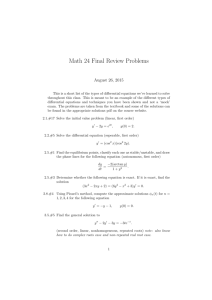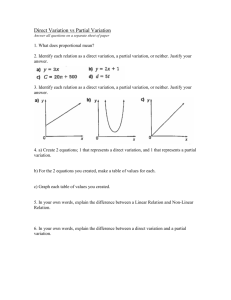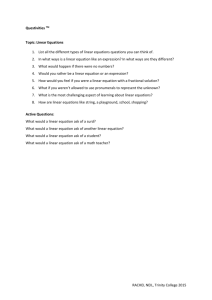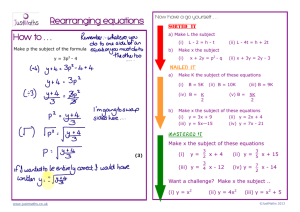Syllabus - University Faculty
advertisement
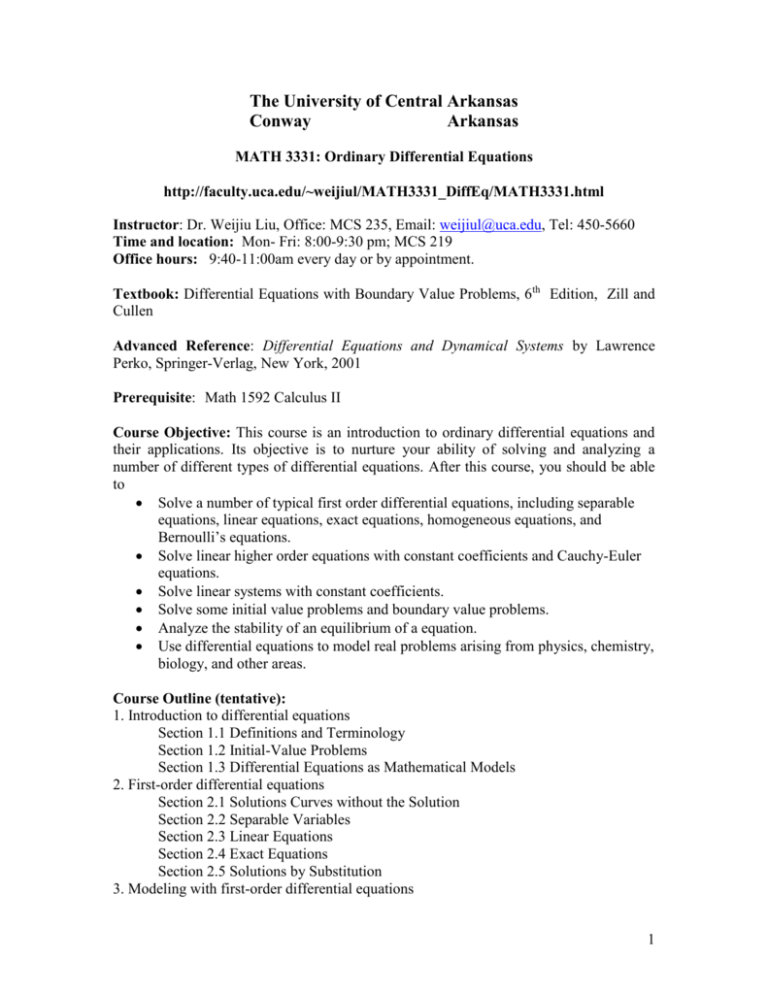
The University of Central Arkansas Conway Arkansas MATH 3331: Ordinary Differential Equations http://faculty.uca.edu/~weijiul/MATH3331_DiffEq/MATH3331.html Instructor: Dr. Weijiu Liu, Office: MCS 235, Email: weijiul@uca.edu, Tel: 450-5660 Time and location: Mon- Fri: 8:00-9:30 pm; MCS 219 Office hours: 9:40-11:00am every day or by appointment. Textbook: Differential Equations with Boundary Value Problems, 6th Edition, Zill and Cullen Advanced Reference: Differential Equations and Dynamical Systems by Lawrence Perko, Springer-Verlag, New York, 2001 Prerequisite: Math 1592 Calculus II Course Objective: This course is an introduction to ordinary differential equations and their applications. Its objective is to nurture your ability of solving and analyzing a number of different types of differential equations. After this course, you should be able to Solve a number of typical first order differential equations, including separable equations, linear equations, exact equations, homogeneous equations, and Bernoulli’s equations. Solve linear higher order equations with constant coefficients and Cauchy-Euler equations. Solve linear systems with constant coefficients. Solve some initial value problems and boundary value problems. Analyze the stability of an equilibrium of a equation. Use differential equations to model real problems arising from physics, chemistry, biology, and other areas. Course Outline (tentative): 1. Introduction to differential equations Section 1.1 Definitions and Terminology Section 1.2 Initial-Value Problems Section 1.3 Differential Equations as Mathematical Models 2. First-order differential equations Section 2.1 Solutions Curves without the Solution Section 2.2 Separable Variables Section 2.3 Linear Equations Section 2.4 Exact Equations Section 2.5 Solutions by Substitution 3. Modeling with first-order differential equations 1 Section 3.1 Linear Equations Section 3.2 Nonlinear Equations Section 3.3 Modeling with Systems of Differential Equations 4. Differential equations of higher order Section 4.1 Linear Differential Equations: Basic Theory Section 4.2 Reduction of Order Section 4.3 Homogeneous Linear Equations with Constant Coefficients Section 4.4 Undetermined Coefficients: Superposition Approach Section 4.6 Variation of Parameters Section 4.7 Cauchy-Euler Equation Section 4.9 Nonlinear Differential Equations 5. Modeling with higher order differential equations Section 5.1 Linear Models: Initial-Value Problems Section 5.2 Linear Equations: Boundary-Value Problems Section 5.3 Nonlinear Models 6. Systems of linear first-order differential equations Section 8.1 Preliminary Theory Section 8.2 Homogeneous Linear Systems Section 8.3 Nonhomogeneous Linear Systems Section 8.4 Matrix Exponential Homework: Your homework will be assigned every week, posted online at the course website: http://faculty.uca.edu/~weijiul/MATH3331_DiffEq/MATH3331.html and will not be collected. As you know, mathematics is a practiced skill like learning to play a musical instrument or riding a bike, and as such you cannot just read about it and then get it. Thus an ample amount of practice is necessary for understanding a concept clearly and the familiarization with a procedure of solving a problem. However, an "overwhelming" amount of practice is not encouraged since it decreases its efficiency. Two In-class Tests: Tentative test dates are: Jun 15, 29, Fridays. Final Exam: There will be a comprehensive final exam which covers all materials taught in the whole semester. The exam date is July 6 in class. Tests and final exam can be made up provided you have a written reasonable excuse. Please contact the instructor before a test or exam. Grading: Scheme: In-class tests: 60%, 30% each; final exam: 40%. Grade scale: 90-100% 80-89% 70-79% A B C 60-69% 0-59% D F Attendance: Regular attendance and participation are extremely important. If you have more than %10 absences, without a valid excuse, you may be dropped from the course. 2 Note: Please familiarize yourself with policies listed in the Student Handbook such as the sexual harassment policy and the various academic policies. Plagiarism, copying from others on tests, the use of unauthorized materials on tests, or any other form of academic misconduct is not tolerated. Penalties for academic misconduct are described in the UCA Student Handbook and can include grade reduction or expulsion. UCA adheres to the requirements of the Americans with Disabilities Act. If you need an accommodation under this Act due to a disability, please contact the UCA Office of Disability Services at 450-3135. 3

